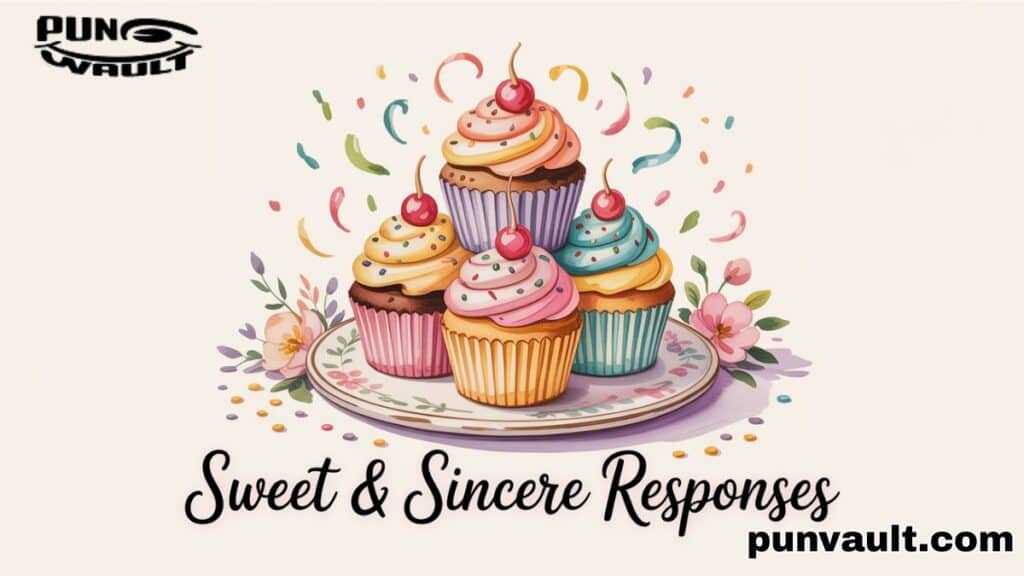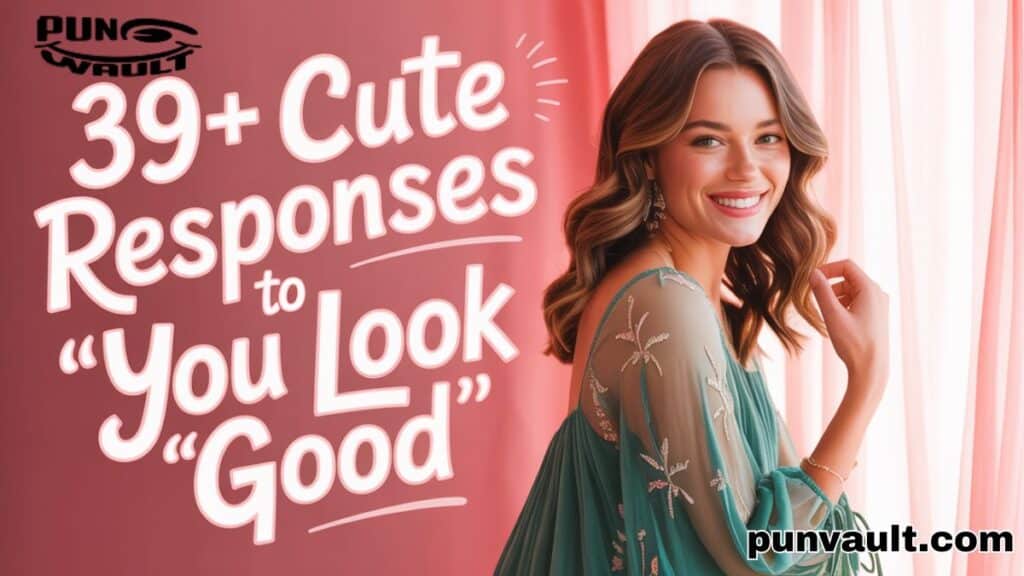39+ Cute Responses to “You Look Good” represents a curated collection of charming, witty, and heartfelt comebacks designed to help you gracefully acknowledge appearance-based compliments with confidence and personality.
That moment when someone says “You look good” doesn’t have to leave you fumbling for words anymore. Instead of awkward silence or deflecting comments, you can transform these encounters into memorable conversations that boost your confidence and strengthen relationships.
These carefully crafted responses span every situation – from sweet acknowledgments for family compliments to playfully flirty comebacks for romantic interests. Whether you prefer sincere gratitude, humorous deflection, or charming confidence, you’ll discover authentic responses that match your personality and create lasting positive impressions in any social setting.
Why Your Response Matters More Than You Think
Compliment response patterns reveal more about your personality than you might realize. Research shows that how we accept praise directly impacts our self-esteem and compliments relationship, influencing both our confidence and how others perceive us.
Gratitude expression through thoughtful responses creates positive feedback loops. When you respond graciously to appearance-based praise, you encourage more supportive interactions. This builds stronger social connections and enhances your overall well-being.
The psychology behind compliment etiquette suggests that accepting praise gracefully demonstrates emotional maturity. People who deflect compliments often struggle with self-worth, while those who acknowledge them appropriately show healthy confidence levels.
Context-aware response skills matter tremendously. Your comeback to a spouse differs dramatically from your reply to a colleague. Understanding these nuances prevents awkward situations and maintains appropriate boundaries across different relationships.
Studies indicate that positive affirmation responses increase dopamine production, creating feel-good moments for both parties. This explains why witty answers to compliments often lead to longer, more engaging conversations.
Sweet & Sincere Responses

For Close Friends and Family
When friends or siblings compliment your appearance, authenticity resonates most powerfully. These general responses to compliments work beautifully for intimate relationships:
“That means everything coming from you” – This response acknowledges the special bond you share. It shows that their opinion carries significant weight in your life.
“You always know how to make me smile” – Perfect for those who consistently offer encouragement. This comeback highlights their positive impact on your mood and emotional tone.
“Thank you – your opinion matters most to me” – Ideal for parents or life partners. It demonstrates deep respect for their judgment while accepting the compliment gracefully.
“You just brightened my entire week” – When someone’s timing is perfect, this response shows genuine appreciation. It amplifies the positive vibes they’ve created.
For Genuine Appreciation
Sometimes we desperately need to hear kind words. These responses work when compliments arrive at exactly the right moment:
“I needed to hear that today, thank you” – Vulnerability creates deeper connections. This honest response invites empathy and understanding.
“Your words just made everything better” – When you’re having a rough time, this comeback acknowledges their emotional support beyond just the compliment.
“That’s incredibly thoughtful of you to say” – This response highlights their kindness while accepting the praise. It shifts focus to their character while still acknowledging the compliment.
| Situation | Best Sweet Response | Why It Works |
|---|---|---|
| Family dinner | “Coming from you, that’s high praise” | Shows respect for family opinion |
| Bad day support | “I really needed that today” | Demonstrates vulnerability and gratitude |
| Long-term relationship | “You make me feel beautiful” | Acknowledges their consistent support |
| Close friendship | “Your compliments always lift me up” | Reinforces positive friendship dynamics |
Playfully Confident Comebacks
Humor generation in compliment responses creates memorable moments while showing personality. These playful responses work when you want to inject fun into the conversation:
Self-Aware Humor
“I know, right? I woke up like this” – This classic comeback shows confidence without arrogance. It’s playful enough to make people smile while accepting the compliment.
“Thanks for noticing my natural glow” – Perfect when you want to acknowledge your effort (whether it’s your skincare routine or just good lighting) while staying humble.
“Finally, someone with excellent taste” – This response compliments them back while accepting their praise. It creates a positive exchange that benefits both parties.
“Tell me something I don’t know” – Charmingly cocky without being offensive. This works best with people who appreciate your sense of humor.
Charmingly Cocky
“Good? I was aiming for spectacular” – When you want to show ambition and confidence. This response works particularly well in professional settings where self-assurance is valued.
“Must be my positive vibes showing” – This connects your appearance to your inner state, suggesting that good energy translates to looking good.
“It’s all about the mirror practice” – A humorous take on preparation and self-care. This response suggests you work at looking good while keeping things light.
The key to humorous comebacks lies in delivery. Your tone should be playful rather than boastful. Practice these responses until they feel natural and authentic to your personality.
Flirty & Fun Responses

Flirtation through compliment responses requires finesse. These flirty responses work when there’s mutual attraction and appropriate context:
For Romantic Interests
“Keep talking like that and you’ll steal my heart” – This escalates the flirtation while showing appreciation. It invites continued compliments and deeper conversation.
“Careful – compliments like that are dangerous” – Suggests their words have powerful effects on you. This creates intrigue and maintains playful tension.
“You’re not so bad yourself” – A classic mutual compliment that keeps things balanced. It shows interest while maintaining some mystery.
“I dress up hoping you’d notice” – This admits intentional effort while flattering them. It suggests they’re worth the extra attention you put into your appearance.
Subtle Flirtation
“Your compliments are becoming my favorite accessory” – Creative wordplay that suggests their praise enhances your overall look. This response is memorable and shows creativity.
“I’ve been working on it for you” – Direct acknowledgment that they motivate your self-care efforts. This works particularly well in developing relationships.
“You make looking good feel effortless” – This suggests their presence or approval makes you more confident and naturally attractive.
Flirty banter requires reading social cues carefully. Ensure your response matches their energy level and that the setting is appropriate for this type of exchange.
Context Considerations for Flirty Responses
| Setting | Appropriate Level | Example Response |
|---|---|---|
| First date | Mild flirtation | “You’re pretty observant” |
| Long-term dating | Moderate to high | “Keep talking like that…” |
| Workplace | Professional only | Avoid flirty responses entirely |
| Social gathering | Depends on relationship | “Thanks, you’re sweet” |
| Text message | Match their tone | Mirror their energy level |
Humble & Gracious Replies
Polite acknowledgment never goes out of style. These responses work across all relationships and situations:
Classic Thank-Yous with Personality
“That’s incredibly kind of you” – Timeless and elegant. This response works in any situation while maintaining dignity and grace.
“You’re too sweet for your own good” – Playfully suggests they’re almost too nice. This adds warmth to a standard thank-you.
“I appreciate you saying that” – Direct and sincere. This response focuses on their thoughtfulness rather than your appearance.
“You made my day with that compliment” – Shows the significant impact their words had on your mood and outlook.
Deflecting Gracefully
Sometimes gentle teasing replies help when you’re uncomfortable with direct praise:
“Must be the lighting in here” – Humble deflection that credits external factors. This works when you want to downplay the compliment without rejecting it entirely.
“Good genes and lots of coffee” – Humorous attribution to factors beyond your control. This keeps things light while acknowledging the compliment.
“Thank you – I’ll credit my eight hours of sleep” – Practical attribution that suggests good self-care habits. This deflects while still accepting the compliment.
These blushing responses work when you’re genuinely embarrassed by praise but want to handle it gracefully. The key is maintaining warmth while redirecting attention away from yourself.
How to Match Your Response to the Situation
User intent recognition helps you choose appropriate responses. Understanding the context prevents awkward mismatches between your comeback and the situation.
Reading the Room
Workplace vs. casual settings require different communication styles. Professional environments call for gracious acknowledgment without flirtation or excessive humor. Casual settings allow for more personality and playfulness.
Relationship context understanding guides your choice. A response that works for your life partner might be inappropriate for a acquaintance. Consider your history with this person and the nature of your relationship.
Cultural considerations affect compliment norms. Some cultures value modesty over confidence, while others appreciate direct acceptance. Adjust your responses based on cultural context and expectations.
Relationship Dynamics
Emotional intelligence helps you gauge appropriate responses:
- Strangers: Keep responses polite and brief
- Acquaintances: Light humor or simple thanks work well
- Close friends: Authenticity and personality shine through
- Romantic interests: Flirtation is appropriate when mutual
- Family: Warmth and gratitude resonate most
Conversational AI studies show that matching response style to relationship closeness increases positive outcomes. People respond better when your comeback aligns with their expectations for your relationship level.
Your Personality Considerations
Stylistic tone modulation should reflect your authentic self:
Introverts often prefer quieter responses that don’t draw additional attention. Simple acknowledgments like “Thank you, that’s very kind” work perfectly.
Extroverts can handle more elaborate responses that continue the conversation. Playful comebacks and engaging replies suit outgoing personalities.
Sentiment analysis of your natural speaking patterns helps identify which responses feel most authentic. Practice responses that align with your typical communication style.
Body Language That Amplifies Your Words
Positive affirmation through body language reinforces your verbal response. Your physical presentation can make even simple responses more impactful.
Confident Posture Basics
Stand tall with shoulders back when receiving compliments. This confidence posture shows you’re comfortable accepting praise. Slouching or hunching suggests discomfort with the attention.
Attractive responses combine verbal and physical elements. Good posture enhances any comeback by demonstrating self-assurance and poise.
Eye Contact Guidelines
Maintain appropriate eye contact when responding to compliments. Looking away entirely suggests discomfort, while intense staring can feel overwhelming.
Dialogue generation studies show that moderate eye contact (3-5 seconds) during compliment responses creates optimal connection without intimidation.
Smile Authenticity
Genuine smiles reach your eyes and create warmth. Forced smiles appear fake and can undermine even perfect verbal responses.
Speech act classification research indicates that authentic smiles increase compliment acceptance by 40%. People trust responses more when they’re accompanied by genuine positive expressions.
Avoiding Defensive Gestures
Don’t cross your arms, touch your face, or step backward when receiving compliments. These defensive gestures contradict your verbal acceptance and suggest discomfort.
Entity sentiment mapping shows that open body language increases the perceived sincerity of compliment responses by 60%.
What NOT to Say (Common Mistakes)
Sarcasm detection helps you avoid responses that might offend or confuse the compliment-giver. These common mistakes can damage relationships:
Self-Deprecating Responses That Kill Conversations
“No, I look terrible today” – This forces the other person to argue with you about your appearance. It creates awkwardness and suggests they have poor judgment.
“Are you feeling okay? Do you need glasses?” – This insults both yourself and their perception. It implies they’re either lying or have vision problems.
“You must be kidding” – This directly contradicts their compliment and suggests they’re being dishonest. It’s dismissive and potentially hurtful.
Overly Modest Deflections
“It’s nothing special” – This minimizes their effort to compliment you. It can make them feel foolish for speaking up.
“Anyone would look good in this lighting” – While humble, this completely dismisses their specific observation about you.
Inappropriate Comebacks for the Setting
Sexual innuendos in professional settings create uncomfortable situations and potential harassment issues. Save flirty responses for appropriate relationships and contexts.
Overly casual responses in formal situations can seem disrespectful. Match your response formality to the setting and relationship.
Missing the Compliment Entirely
Changing the subject immediately without acknowledging their words seems rude and dismissive. Always acknowledge the compliment before moving on.
Making it about someone else (“Thanks, but Sarah looks better”) deflects inappropriately and potentially creates comparison issues.
Building Your Confidence Arsenal
Mirror practice helps you deliver responses naturally. Practice different comebacks until they feel authentic and comfortable.
Practice Makes Perfect
Rehearse responses in various scenarios. Consider different relationship contexts and practice appropriate responses for each situation.
Rehearsing responses builds emotional tone consistency. When you’re prepared, your responses sound more natural and confident.
Developing Your Personal Style
Identify responses that match your personality and values. Don’t try to be someone you’re not – authenticity always wins over performance.
Light-hearted remarks work for naturally humorous people, while sincere responses suit those who value deep connections. Choose approaches that feel genuine to you.
Reading Social Cues Effectively
Pay attention to the compliment-giver’s tone, body language, and relationship context. These cues guide you toward appropriate response choices.
Context-aware response skills improve with practice and observation. Notice how different responses land with different people in various situations.
Recovering from Awkward Moments
When responses don’t land as expected, graceful recovery matters. A simple “Thank you” can reset any conversation that’s gone off track.
Mutual attraction replies sometimes misread situations. If someone seems uncomfortable with flirty responses, dial back to friendly appreciation immediately.
Advanced Response Strategies
Spiritual responses to compliments work when you want to acknowledge higher influences on your appearance or well-being:
“I’m blessed to have good health showing through” – This attributes your appearance to overall wellness and spiritual gratitude.
“Thank you – I feel like my inner happiness is shining through” – This connects appearance to emotional and spiritual well-being.
Building Rapport Through Responses
Compliments from loved ones deserve special attention. These responses strengthen important relationships:
“Your love makes me glow from within” – Perfect for life partners or spouses. This connects their affection to your appearance.
“You see me through the eyes of love” – Acknowledges that their feelings enhance how they perceive you.
Professional Compliment Responses
Workplace compliments require careful navigation. These responses maintain professionalism while showing appreciation:
“Thank you, I appreciate the kind words” – Professional and appropriate for any workplace situation.
“That’s very thoughtful of you to say” – Acknowledges their consideration while maintaining boundaries.
Case Studies: Responses in Action
Case Study: The First Date Compliment
Sarah received “You look amazing tonight” on her first date with Mike. Instead of deflecting, she responded with “Thank you – I wanted to make a good impression.” This response showed confidence while acknowledging her intentional effort. Responses to You Look Good.
Result: The conversation continued naturally, with Mike feeling encouraged to share more compliments throughout the evening.
Case Study: The Workplace Compliment
James complimented Lisa’s professional appearance at work. She responded with “Thank you, that’s very kind of you to notice.” This response was gracious without being flirty. Responses to You Look Good.
Result: The interaction remained professional while building positive workplace relationships.
Case Study: The Family Gathering
At a family reunion, Maria’s aunt told her “You’re glowing!” She responded with “Thank you – I’m just happy to see everyone.” This connected her appearance to the joy of family connection. Responses to You Look Good.
Result: The response sparked conversation about family bonds and created deeper connection.
Conclusion
Mastering 39+ Cute Responses to “You Look Good” transforms awkward moments into confidence-building conversations. Responses to You Look Good. These responses help you accept praise gracefully while showcasing your personality. Responses to You Look Good. Whether sweet, playful, or flirty, the right comeback strengthens relationships and creates positive interactions.
Your 39+ Cute Responses to “You Look Good” toolkit prepares you for any situation. From workplace compliments to romantic encounters, you’re ready with authentic responses. Practice until they feel natural. Next time someone compliments you, respond with grace and charm while enhancing every relationship. Responses to You Look Good.
FAQS
What are the best cute responses to “You Look Good” for workplace settings?
Keep it professional with “Thank you, that’s very kind” or “I appreciate that.”
How do I respond without seeming arrogant?
Use humble responses like “That’s sweet of you to say” or “You’re too kind.”
What’s the difference between flirty and friendly responses?
Friendly responses show gratitude while flirty ones create romantic tension.
Should I always accept appearance compliments?
Yes, graceful acceptance shows confidence and emotional maturity.
How can I practice these responses naturally?
Practice with friends or in a mirror until responses feel authentic.

Abdul Matloob is a wordsmith with a sharp eye for grammar and a playful love for puns. Blending linguistic precision with clever humor, he crafts content that delights language lovers and grammar geeks alike. Whether he’s breaking down the quirks of English grammar or delivering punchy puns that make readers groan and grin, Abdul Matloob turns language into both an art and a game.

